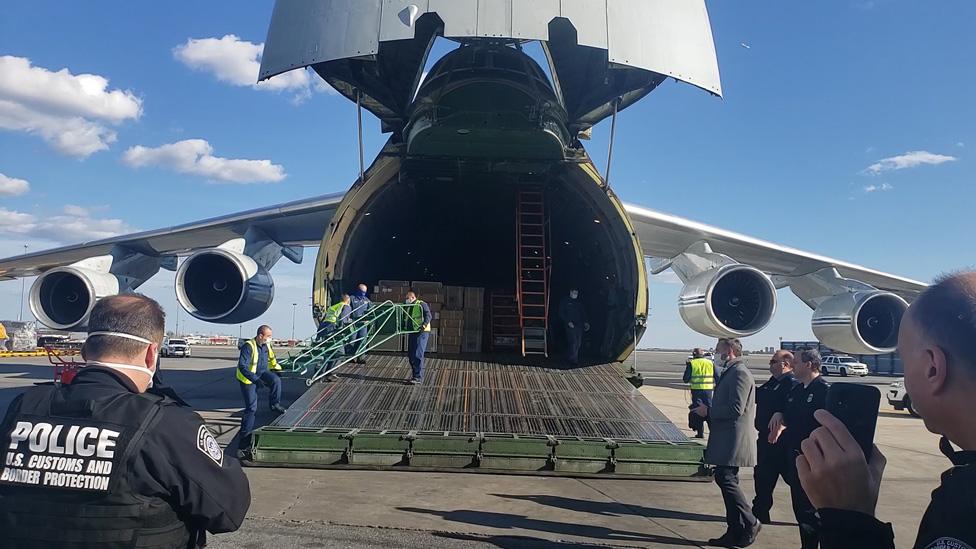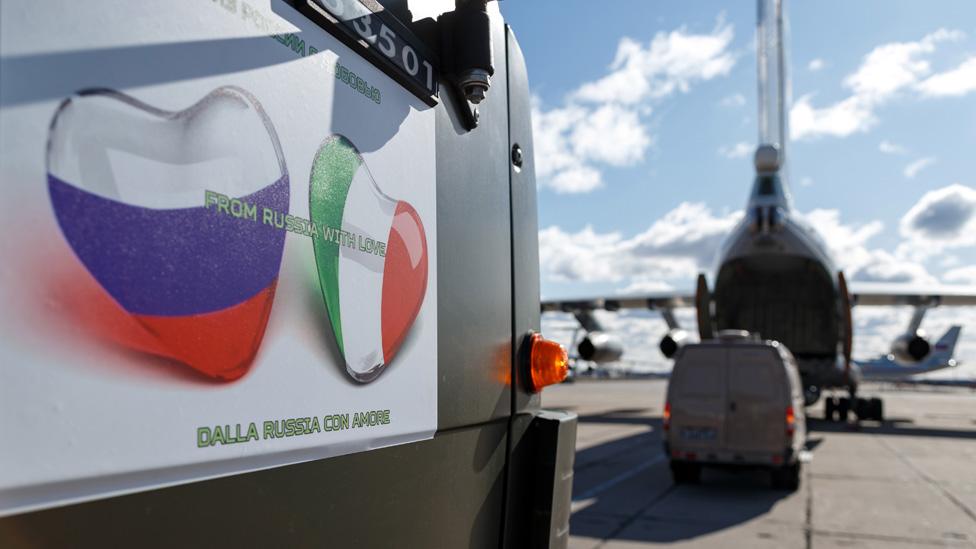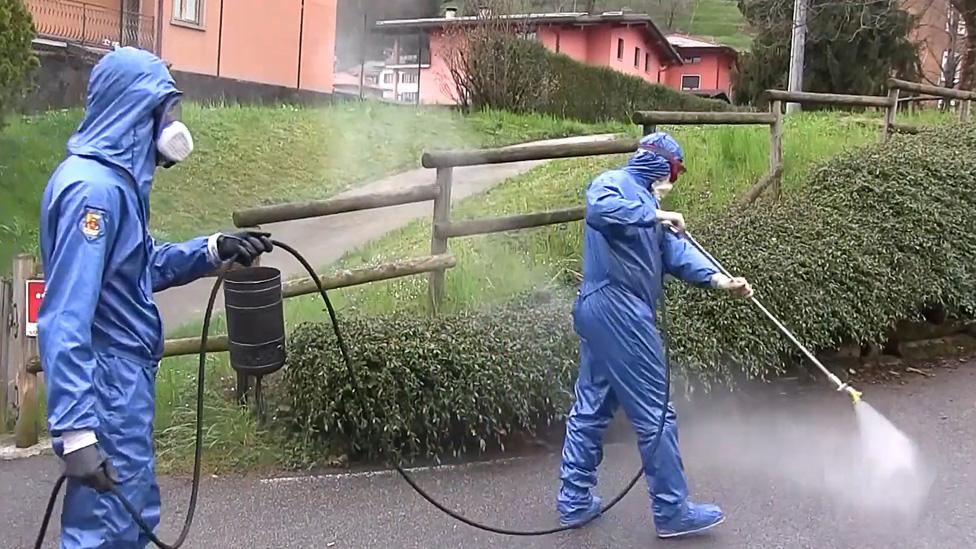Coronavirus: What does ‘from Russia with love’ really mean?
- Published

Russian medical supplies being unloaded from a military plane in New York
Russia's latest gesture in the coronavirus crisis came in the form of medical supplies arriving in New York - part of an operation dubbed "from Russia with love" by the Kremlin.
In late March a similar cargo was flown to Italy - the worst-hit country in the crisis - along with 100 Russian military medics.
Russian media speak of widespread gratitude for this generosity, but how much of that is fact, how much fiction?
Is Russia exploiting this crisis?
US Secretary of State Mike Pompeo tweeted, external that the US had paid for the Russian supplies, and that "we have to work together to defeat #COVID19".
The US says the delivery was agreed in a phone conversation between President Donald Trump and President Vladimir Putin a few days ago.
The Russian foreign ministry says the US paid for half of the supplies, and the other half was donated by Russia.
But Russian TV channels call the cargo "aid" and make no reference to payment.
A report by Gazprom Media's NTV described how excited JFK airport staff filmed the Russian plane, took selfies next to it and thanked the pilots and President Putin.
New York is a coronavirus hotspot and the US death toll has risen above 5,000, according to Johns Hopkins University.
US death rates v UK, Italy and South Korea
Russia has imposed a lockdown similar to those in the US and Europe, to limit the spread of Covid-19 disease.
In the past 24 hours, Russia registered 771 new infections - its highest figure so far - bringing the total to 3,548 current cases and 30 deaths.
Russians have been sent home from work, but will still be paid - a measure now extended by President Putin until 30 April.
Russia needled by criticism
The medical aid for Italy certainly received official thanks, but there was some scepticism too about Russia's intentions.

Russian medical aid for Italy is officially branded "from Russia with love"
Italian newspaper La Stampa said, according to its sources, the aid had little practical value and was more like a geopolitical opportunity for Mr Putin. It went so far as to brand 80% of the delivery "useless".
When asked about that, Russia's ambassador to the US, Anatoly Antonov, reacted angrily, saying "groundless criticism and lack of trust for the assistance that Russia provides to Italy is cynical, immoral and cruel to those who are fighting for their lives".
Russia's defence ministry also hit back, saying the article was fuelling anti-Russian fake news and its authors were hiding behind the ideals of free speech.
Back in Russia, the media have applauded the aid to Italy with headlines like "Thank you for extending a helping hand" and "USA and Europe should learn a lesson".
Cold War tensions, like those in the 1963 James Bond spy movie From Russia With Love, have clearly not gone away.
Italian Defence Minister Lorenzo Guerini did thank Russia officially as did, unofficially, former Italian Prime Minister Silvio Berlusconi, a friend of Vladimir Putin.

Russian military specialists disinfected an area around a care home in Vertova, northern Italy
An Italian pop singer spoke a few words of Russian, when interviewed by Tass news agency. Another one sang a popular Russian song in a Facebook video.
But Russian state media conveyed the impression of mass support for Russia in Italy.
Controversial anthem videos
State channels, pro-Kremlin websites and Telegram channels talked about ordinary Italians replacing EU flags with Russian ones and singing the Russian anthem on balconies.
To prove that, however, there was just one video and one man: Federico Cane., external
BBC Russian spoke to Mr Cane. He is an engineer, who says he is personally fond of Russia and of President Putin.
He has done some business with Russian companies and he put up a Russian flag as personal thanks for the medical aid.

A SIMPLE GUIDE: What are the symptoms?
US v ITALY v CHINA: How do death rates compare?
LEADING THE WAY: The US governor who saw it coming early
ON FRONTLINE: 'Nurses prepare for the worst but not this'
REASON TO HOPE: The good that may come out of this crisis

Another claim in Russian state media was about widespread singing of the Russian national anthem in Italy.
Interestingly, Chinese media had earlier faked Italian balcony-singing of the Chinese anthem. An Italian media outlet debunked the video, external - one of many showing Italians crowding on their balconies in the lockdown.
Russian state media used two videos of a recording of the Russian anthem being played (not sung). In one instance, it was linked to Italian trade union UGL., external
The anthem seems to blast from a building housing the neo-fascist CasaPound organisation in Rome. The UGL trade union is historically linked to CasaPound, and the head of UGL has visited Russia several times.
Another video was filmed from inside a flat, with the Russian anthem heard in the background, external. It was initially posted by Alena Sivkova, head of Daily Storm, a Russian news website.
The video was widely used by Russian news channels and online media such as RenTV, Izvestia, TV Tsentr and Russia-1.
BBC Russian found out that the video was filmed by one of the journalist's relatives, who lives in Italy and is married to an Italian. He apparently played a recording of the anthem.
Sivkova insisted that this was not a one-off occurrence and that other Italians joined in regularly in the town of Imola. There is no independent proof of that and BBC Russian was unable to get any comment from the Imola mayor's office.
Ilya Shepelin runs a project called Fake News on Russia's opposition TV Rain channel. For him, the manipulation of fact and fiction in this instance is a perfect example of hybrid fake news. When fact and fiction are so tightly intertwined they can hardly be separated, he says.
Yet Russian authorities themselves are now warning about fake news.
Under new emergency laws, anyone spreading false information about the coronavirus crisis in Russia can face up to five years in prison.
- Published31 March 2020
